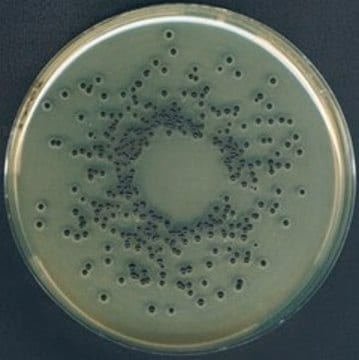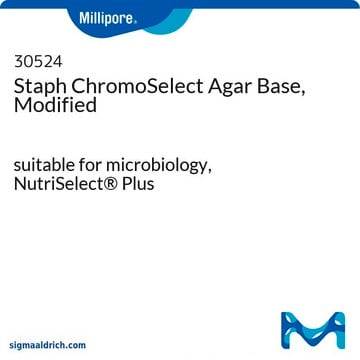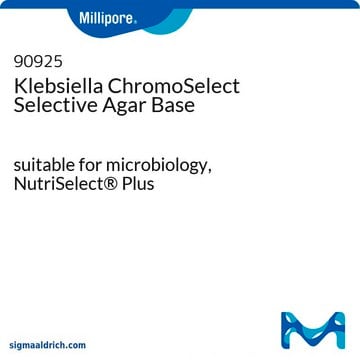05662
Aureus ChromoSelect Agar Base
NutriSelect® Plus, suitable for microbiology
Sinónimos:
Staphylococcus aureus Agar ChromoSelect, Aureus Agar Base ChromoSelect
About This Item
Productos recomendados
sterility
non-sterile
Quality Level
form
powder
shelf life
limited shelf life, expiry date on the label
composition
agar, 20 g/L
beef extract, 6 g/L
casein enzymic hydrolysate, 12 g/L
chromogenic mixture, 2.1 g/L
lithium chloride, 5 g/L
pancreatic digest of gelatin, 3 g/L
sodium pyruvate, 10 g/L
yeast extract, 5 g/L
manufacturer/tradename
NutriSelect® Plus
final pH
7.0±0.2 (25 °C)
application(s)
agriculture
bioburden testing
clinical testing
environmental
food and beverages
veterinary
microbiology
suitability
selective and differential for Staphylococcus spp.
Application
Preparation Note
Other Notes
Footnote
The designations basic, plus, or prime are added to indicate the quality control level, from basic quality control to standard QC plus to prime for full regulatory compliance.
Legal Information
signalword
Warning
hcodes
Hazard Classifications
Eye Irrit. 2 - Skin Sens. 1
Storage Class
11 - Combustible Solids
wgk_germany
WGK 3
flash_point_f
Not applicable
flash_point_c
Not applicable
Elija entre una de las versiones más recientes:
¿Ya tiene este producto?
Encuentre la documentación para los productos que ha comprado recientemente en la Biblioteca de documentos.
Los clientes también vieron
Artículos
Chromogenic media enable the selective detection of S. aureus, which produce bluish-green colonies that are clearly differentiated from other species.
Chromogenic media enable the selective detection of S. aureus, which produce bluish-green colonies that are clearly differentiated from other species.
Chromogenic media enable the selective detection of S. aureus, which produce bluish-green colonies that are clearly differentiated from other species.
Chromogenic media enable the selective detection of S. aureus, which produce bluish-green colonies that are clearly differentiated from other species.
Nuestro equipo de científicos tiene experiencia en todas las áreas de investigación: Ciencias de la vida, Ciencia de los materiales, Síntesis química, Cromatografía, Analítica y muchas otras.
Póngase en contacto con el Servicio técnico













